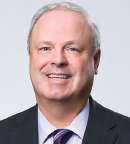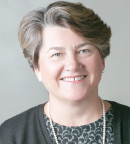Howard A. “Skip” Burris III, MD, FACP, FASCO, of Sarah Cannon and Tennessee Oncology, and Therese Marie Mulvey, MD, FASCO, of Massachusetts General Hospital North Shore Cancer Center, were selected by the ASCO Nominating Committee as candidates for ASCO President-Elect. Below, the candidates share their visions for ASCO’s role over the next 10 years.

Howard A. “Skip” Burris III, MD, FACP, FASCO

Therese Marie Mulvey, MD, FASCO
Read complete interviews and find biographical information from every candidate at asco.org/ election, along with a link to the secure proxy ballot. If you are a member who is eligible to vote, remember to make your voice heard before the election closes on December 4, 2017.
What do you see as the future of ASCO and the field of cancer research and care in the next 5 to 10 years? What is the most important role for the Society in shaping the global oncology community within the next 10 years?
Howard Burris: The future of cancer research and care over the next 5 to 10 years is likely to evolve substantially, as is ASCO’s role in helping to shape the oncology community. The number of cancer survivors—those living with [cancer] and in remission—is estimated to exceed 20 million in the United States by 2025. The stress on health-care providers to see and care for these individuals will require not only a greater reliance on extenders such as nurse practitioners, but also the use of technologies such as telemedicine. Furthermore, the expertise of ASCO’s leadership and membership will need to be at the forefront of discussions and policies that ensure a viable payment and reimbursement system for our physicians and their patients.
The explosion in scientific advances will necessitate novel approaches to education and awareness. While continued emphasis on clinical trial accrual will be important, the sharing of data to ascertain best practices and analyze outcomes will be key, and initiatives such as CancerLinQ® and QOPI® must become fully integrated into the cancer community.
Precision and personalized medicine will reach new levels of expectation as blood-based testing for circulating DNA and the molecular profiling of cancers (and even early detection) become a routine part of care. ASCO’s leadership in emphasizing education, promoting and advocating cancer research, funding and stimulating early career development, and sharing and analyzing data will expand and remain critical for our success. The future for cancer care is full of promise—but only if we bring the brightest minds to the table.
Therese Mulvey: Predicting the future is nearly impossible, as the science of oncology moves at light speed while the political landscape changes in ways unimagined. Five years ago, when translational oncology was a nascent field, I could not have predicted the rapid advances made in the care of patients with specific diseases with specific mutations. Now the field of precision medicine is leading us into the future. I do know that adequate funding to drive these discoveries and a safe space to encourage young researchers is a role that ASCO must continue to lead. Many of the breakthroughs we now consider standards of care came directly from our supported investigators. The Conquer Cancer Foundation of ASCO and specifically the Women Who Conquer Cancer branch are very important to me, as we fund increasing numbers of Young Investigator Awards and Career Development Awards. The fact that young investigators look to ASCO to begin their research careers is paramount. From this pool of young investigators will come our future leaders, as well as future discoveries in cancer care. Supporting them through philanthropy and advocacy for public funding is critical. The ASCO President must continue to embody the mission of ASCO, and funding cancer research is a large part of achieving both the mission and vision of the organization.
ASCO must continue to lead the world in cancer advocacy, education, and research support. The role ASCO plays globally is one I have seen firsthand. My physician colleagues in Haiti look to ASCO and the International Affairs division for help with patient care daily, whether this is in pharmacy management for critical access drugs, lab support with the collaboration of ASCO and the College of American Pathologists, or patient education materials on Cancer.Net. The recent expansion of the Journal of Global Oncology is welcomed and again positions ASCO as the leader for cancer care providers throughout the world. Seeing this role that ASCO plays firsthand in a low-resource country is inspiring. The role of ASCO President must be to continue to lead the organization to be inclusive of all providers who are trying to alleviate the burden of cancer globally. ■
© 2017. American Society of Clinical Oncology. All rights reserved.

